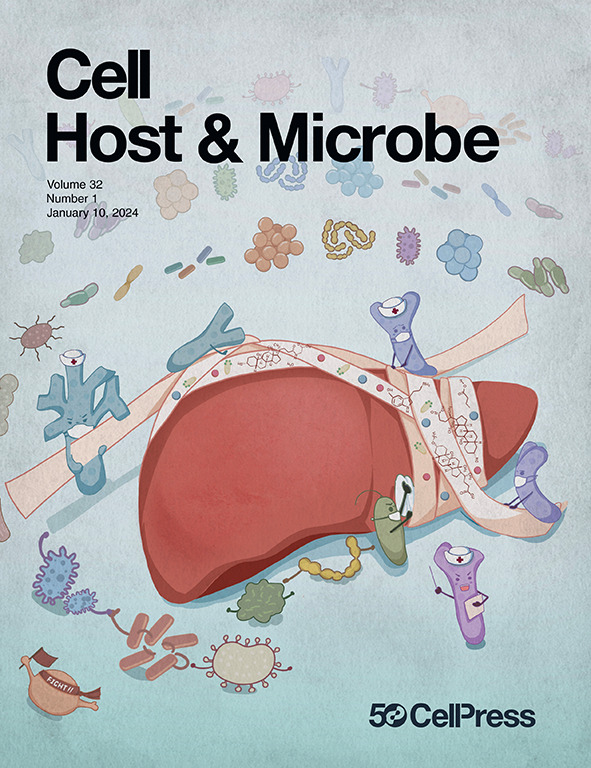肿瘤驻留葡萄球菌产生乳酸促进肺腺癌的转移定植
IF 18.7
1区 医学
Q1 MICROBIOLOGY
引用次数: 0
摘要
肺微生物群在癌症中的作用尚不清楚。在这里,我们发现葡萄球菌在转移性肿瘤病变中选择性富集,并与肺癌患者的肿瘤复发有关。使用患者衍生的细菌菌株,我们采用细胞系、类器官、小鼠同种异体移植和异种移植模型的组合来证明尼泊尔链球菌和猪链球菌促进肺癌细胞的转移潜力。从机制上说,尼泊尔葡萄树和荆芥分泌的乳酸上调肿瘤细胞中MCT1的表达,促进乳酸的摄取并激活假性缺氧信号。这些影响可以通过敲除菌株中产生乳酸的基因(d -乳酸脱氢酶[ddh]/ l -乳酸脱氢酶[ldh])来消除。此外,我们发现抑制MCT1在体内和体外都能减弱葡萄球菌诱导的肿瘤转移。总之,我们的研究结果表明,肿瘤驻留葡萄球菌物种通过激活宿主假性缺氧信号来促进肺癌转移,并进一步确定关键调节因子作为治疗开发的潜在靶点。本文章由计算机程序翻译,如有差异,请以英文原文为准。

Lactate production by tumor-resident Staphylococcus promotes metastatic colonization in lung adenocarcinoma
The role of the lung microbiota in cancer remains unclear. Here, we reveal that Staphylococcus is selectively enriched in metastatic tumor lesions and is associated with tumor recurrence in lung cancer patients. Using patient-derived bacterial strains, we employ a combination of cell line, organoid, mouse allograft, and xenograft models to demonstrate that S. nepalensis and S. capitis promote the metastatic potential of lung cancer cells. Mechanistically, lactate secreted by S. nepalensis and S. capitis upregulates MCT1 expression in tumor cells, facilitating lactate uptake and activating pseudohypoxia signaling. These effects can be eliminated by knocking out the lactate-producing genes (D-lactate dehydrogenase [ddh]/L-lactate dehydrogenase [ldh]) in the bacterial strains. Furthermore, we show that inhibiting MCT1 attenuates Staphylococcus-induced tumor metastasis both in vitro and in vivo. Collectively, our results demonstrate that tumor-resident Staphylococcus species promote lung cancer metastasis by activating host pseudohypoxia signaling and further identify key regulators as potential targets for therapeutic development.
求助全文
通过发布文献求助,成功后即可免费获取论文全文。
去求助
来源期刊

Cell host & microbe
生物-微生物学
CiteScore
45.10
自引率
1.70%
发文量
201
审稿时长
4-8 weeks
期刊介绍:
Cell Host & Microbe is a scientific journal that was launched in March 2007. The journal aims to provide a platform for scientists to exchange ideas and concepts related to the study of microbes and their interaction with host organisms at a molecular, cellular, and immune level. It publishes novel findings on a wide range of microorganisms including bacteria, fungi, parasites, and viruses. The journal focuses on the interface between the microbe and its host, whether the host is a vertebrate, invertebrate, or plant, and whether the microbe is pathogenic, non-pathogenic, or commensal. The integrated study of microbes and their interactions with each other, their host, and the cellular environment they inhabit is a unifying theme of the journal. The published work in Cell Host & Microbe is expected to be of exceptional significance within its field and also of interest to researchers in other areas. In addition to primary research articles, the journal features expert analysis, commentary, and reviews on current topics of interest in the field.
 求助内容:
求助内容: 应助结果提醒方式:
应助结果提醒方式:


